Employability Skills: Evaluating Own Performance at Care UK
VerifiedAdded on 2019/12/03
|9
|3713
|415
Homework Assignment
AI Summary
This assignment delves into the development of employability skills within the healthcare sector, specifically focusing on the context of Care UK. The student evaluates their own responsibilities, performance objectives, and effectiveness, identifying areas for improvement through SWOT analysis and specific recommendations. The assignment explores the development of interpersonal and transferable skills, including work-based solutions, communication strategies, and time management. It also examines problem-solving strategies, evaluating tools and methods to address issues within the Health and Social Care (HSC) sector, and developing a strategy for resolution, considering potential impacts. Furthermore, the assignment emphasizes the importance of motivational techniques to improve the quality of performance, referencing relevant theories and practical applications. The student provides insights into their role, responsibilities, and the application of skills within the healthcare environment, emphasizing the importance of continuous learning and improvement.
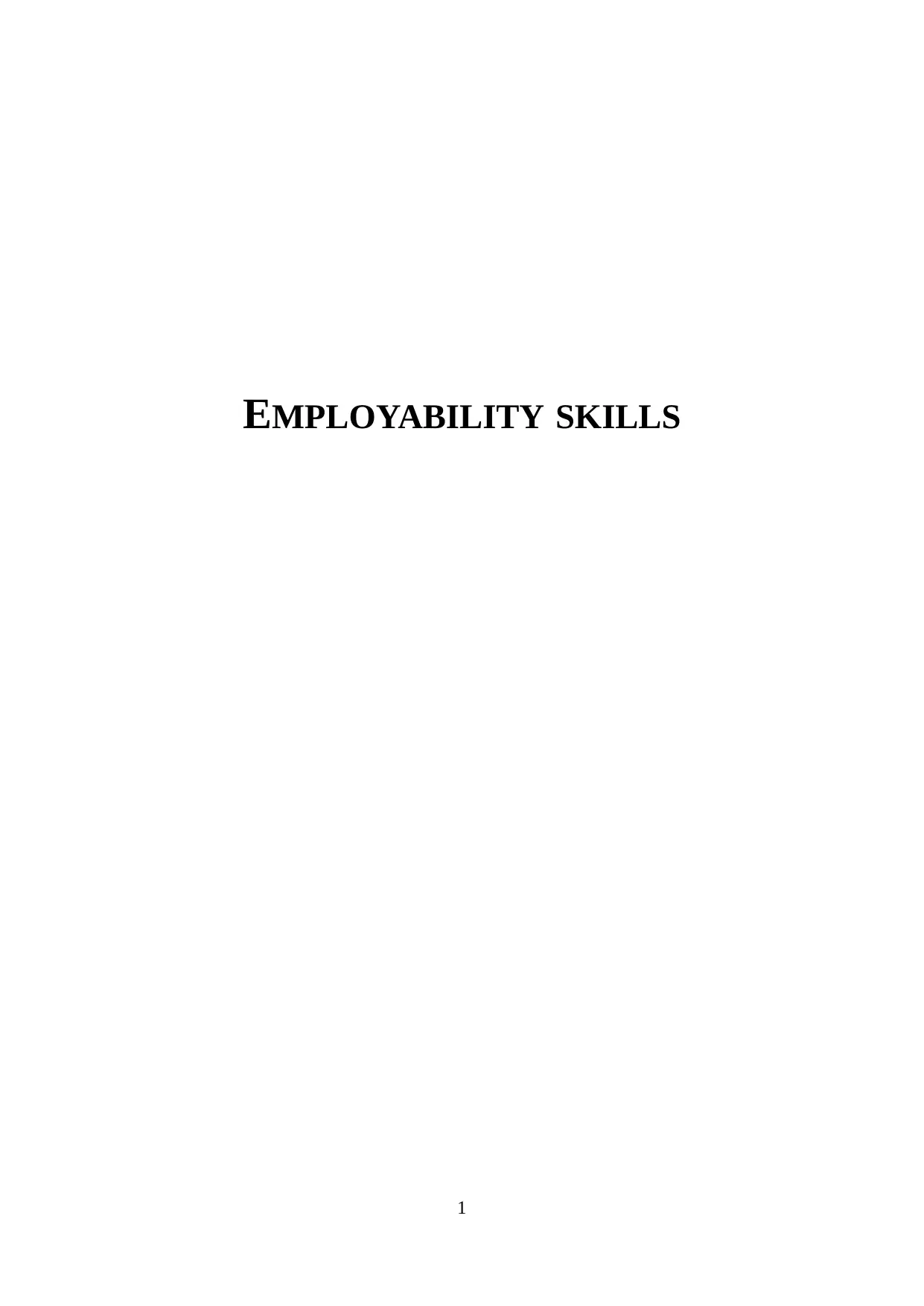
EMPLOYABILITY SKILLS
1
1
Paraphrase This Document
Need a fresh take? Get an instant paraphrase of this document with our AI Paraphraser
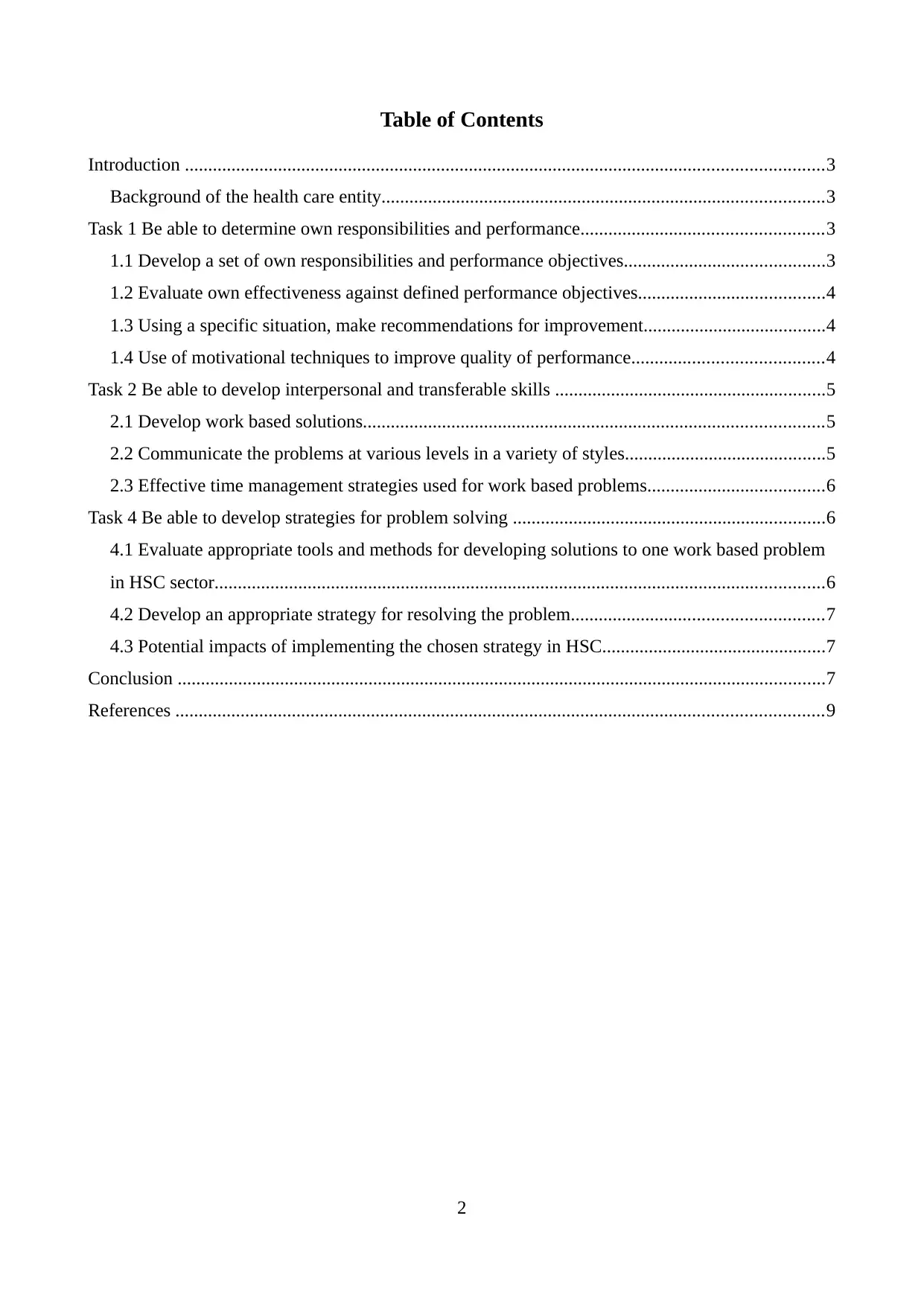
Table of Contents
Introduction .........................................................................................................................................3
Background of the health care entity...............................................................................................3
Task 1 Be able to determine own responsibilities and performance....................................................3
1.1 Develop a set of own responsibilities and performance objectives...........................................3
1.2 Evaluate own effectiveness against defined performance objectives........................................4
1.3 Using a specific situation, make recommendations for improvement.......................................4
1.4 Use of motivational techniques to improve quality of performance.........................................4
Task 2 Be able to develop interpersonal and transferable skills ..........................................................5
2.1 Develop work based solutions...................................................................................................5
2.2 Communicate the problems at various levels in a variety of styles...........................................5
2.3 Effective time management strategies used for work based problems......................................6
Task 4 Be able to develop strategies for problem solving ...................................................................6
4.1 Evaluate appropriate tools and methods for developing solutions to one work based problem
in HSC sector...................................................................................................................................6
4.2 Develop an appropriate strategy for resolving the problem......................................................7
4.3 Potential impacts of implementing the chosen strategy in HSC................................................7
Conclusion ...........................................................................................................................................7
References ...........................................................................................................................................9
2
Introduction .........................................................................................................................................3
Background of the health care entity...............................................................................................3
Task 1 Be able to determine own responsibilities and performance....................................................3
1.1 Develop a set of own responsibilities and performance objectives...........................................3
1.2 Evaluate own effectiveness against defined performance objectives........................................4
1.3 Using a specific situation, make recommendations for improvement.......................................4
1.4 Use of motivational techniques to improve quality of performance.........................................4
Task 2 Be able to develop interpersonal and transferable skills ..........................................................5
2.1 Develop work based solutions...................................................................................................5
2.2 Communicate the problems at various levels in a variety of styles...........................................5
2.3 Effective time management strategies used for work based problems......................................6
Task 4 Be able to develop strategies for problem solving ...................................................................6
4.1 Evaluate appropriate tools and methods for developing solutions to one work based problem
in HSC sector...................................................................................................................................6
4.2 Develop an appropriate strategy for resolving the problem......................................................7
4.3 Potential impacts of implementing the chosen strategy in HSC................................................7
Conclusion ...........................................................................................................................................7
References ...........................................................................................................................................9
2
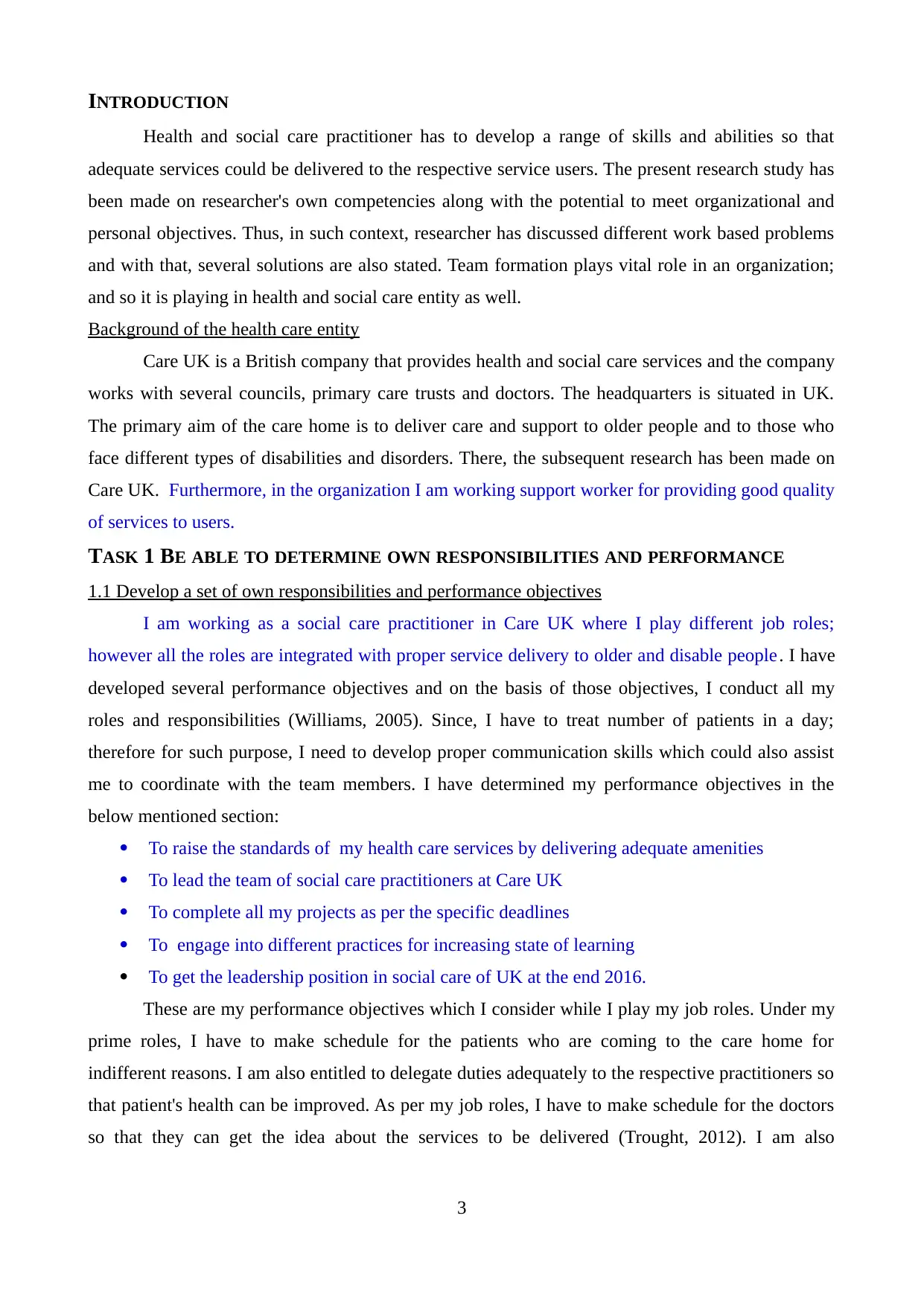
INTRODUCTION
Health and social care practitioner has to develop a range of skills and abilities so that
adequate services could be delivered to the respective service users. The present research study has
been made on researcher's own competencies along with the potential to meet organizational and
personal objectives. Thus, in such context, researcher has discussed different work based problems
and with that, several solutions are also stated. Team formation plays vital role in an organization;
and so it is playing in health and social care entity as well.
Background of the health care entity
Care UK is a British company that provides health and social care services and the company
works with several councils, primary care trusts and doctors. The headquarters is situated in UK.
The primary aim of the care home is to deliver care and support to older people and to those who
face different types of disabilities and disorders. There, the subsequent research has been made on
Care UK. Furthermore, in the organization I am working support worker for providing good quality
of services to users.
TASK 1 BE ABLE TO DETERMINE OWN RESPONSIBILITIES AND PERFORMANCE
1.1 Develop a set of own responsibilities and performance objectives
I am working as a social care practitioner in Care UK where I play different job roles;
however all the roles are integrated with proper service delivery to older and disable people. I have
developed several performance objectives and on the basis of those objectives, I conduct all my
roles and responsibilities (Williams, 2005). Since, I have to treat number of patients in a day;
therefore for such purpose, I need to develop proper communication skills which could also assist
me to coordinate with the team members. I have determined my performance objectives in the
below mentioned section:
To raise the standards of my health care services by delivering adequate amenities
To lead the team of social care practitioners at Care UK
To complete all my projects as per the specific deadlines
To engage into different practices for increasing state of learning
To get the leadership position in social care of UK at the end 2016.
These are my performance objectives which I consider while I play my job roles. Under my
prime roles, I have to make schedule for the patients who are coming to the care home for
indifferent reasons. I am also entitled to delegate duties adequately to the respective practitioners so
that patient's health can be improved. As per my job roles, I have to make schedule for the doctors
so that they can get the idea about the services to be delivered (Trought, 2012). I am also
3
Health and social care practitioner has to develop a range of skills and abilities so that
adequate services could be delivered to the respective service users. The present research study has
been made on researcher's own competencies along with the potential to meet organizational and
personal objectives. Thus, in such context, researcher has discussed different work based problems
and with that, several solutions are also stated. Team formation plays vital role in an organization;
and so it is playing in health and social care entity as well.
Background of the health care entity
Care UK is a British company that provides health and social care services and the company
works with several councils, primary care trusts and doctors. The headquarters is situated in UK.
The primary aim of the care home is to deliver care and support to older people and to those who
face different types of disabilities and disorders. There, the subsequent research has been made on
Care UK. Furthermore, in the organization I am working support worker for providing good quality
of services to users.
TASK 1 BE ABLE TO DETERMINE OWN RESPONSIBILITIES AND PERFORMANCE
1.1 Develop a set of own responsibilities and performance objectives
I am working as a social care practitioner in Care UK where I play different job roles;
however all the roles are integrated with proper service delivery to older and disable people. I have
developed several performance objectives and on the basis of those objectives, I conduct all my
roles and responsibilities (Williams, 2005). Since, I have to treat number of patients in a day;
therefore for such purpose, I need to develop proper communication skills which could also assist
me to coordinate with the team members. I have determined my performance objectives in the
below mentioned section:
To raise the standards of my health care services by delivering adequate amenities
To lead the team of social care practitioners at Care UK
To complete all my projects as per the specific deadlines
To engage into different practices for increasing state of learning
To get the leadership position in social care of UK at the end 2016.
These are my performance objectives which I consider while I play my job roles. Under my
prime roles, I have to make schedule for the patients who are coming to the care home for
indifferent reasons. I am also entitled to delegate duties adequately to the respective practitioners so
that patient's health can be improved. As per my job roles, I have to make schedule for the doctors
so that they can get the idea about the services to be delivered (Trought, 2012). I am also
3
⊘ This is a preview!⊘
Do you want full access?
Subscribe today to unlock all pages.

Trusted by 1+ million students worldwide
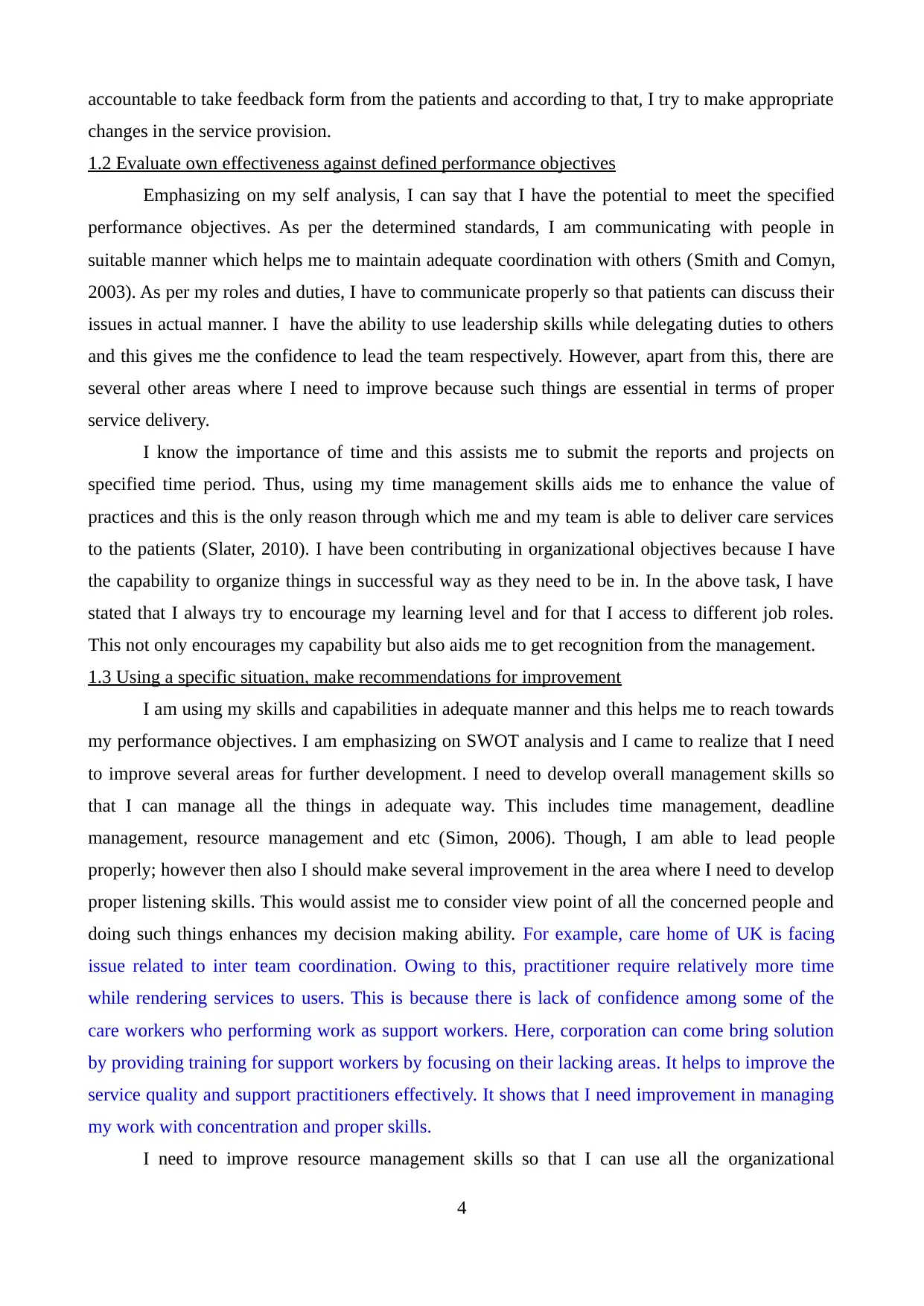
accountable to take feedback form from the patients and according to that, I try to make appropriate
changes in the service provision.
1.2 Evaluate own effectiveness against defined performance objectives
Emphasizing on my self analysis, I can say that I have the potential to meet the specified
performance objectives. As per the determined standards, I am communicating with people in
suitable manner which helps me to maintain adequate coordination with others (Smith and Comyn,
2003). As per my roles and duties, I have to communicate properly so that patients can discuss their
issues in actual manner. I have the ability to use leadership skills while delegating duties to others
and this gives me the confidence to lead the team respectively. However, apart from this, there are
several other areas where I need to improve because such things are essential in terms of proper
service delivery.
I know the importance of time and this assists me to submit the reports and projects on
specified time period. Thus, using my time management skills aids me to enhance the value of
practices and this is the only reason through which me and my team is able to deliver care services
to the patients (Slater, 2010). I have been contributing in organizational objectives because I have
the capability to organize things in successful way as they need to be in. In the above task, I have
stated that I always try to encourage my learning level and for that I access to different job roles.
This not only encourages my capability but also aids me to get recognition from the management.
1.3 Using a specific situation, make recommendations for improvement
I am using my skills and capabilities in adequate manner and this helps me to reach towards
my performance objectives. I am emphasizing on SWOT analysis and I came to realize that I need
to improve several areas for further development. I need to develop overall management skills so
that I can manage all the things in adequate way. This includes time management, deadline
management, resource management and etc (Simon, 2006). Though, I am able to lead people
properly; however then also I should make several improvement in the area where I need to develop
proper listening skills. This would assist me to consider view point of all the concerned people and
doing such things enhances my decision making ability. For example, care home of UK is facing
issue related to inter team coordination. Owing to this, practitioner require relatively more time
while rendering services to users. This is because there is lack of confidence among some of the
care workers who performing work as support workers. Here, corporation can come bring solution
by providing training for support workers by focusing on their lacking areas. It helps to improve the
service quality and support practitioners effectively. It shows that I need improvement in managing
my work with concentration and proper skills.
I need to improve resource management skills so that I can use all the organizational
4
changes in the service provision.
1.2 Evaluate own effectiveness against defined performance objectives
Emphasizing on my self analysis, I can say that I have the potential to meet the specified
performance objectives. As per the determined standards, I am communicating with people in
suitable manner which helps me to maintain adequate coordination with others (Smith and Comyn,
2003). As per my roles and duties, I have to communicate properly so that patients can discuss their
issues in actual manner. I have the ability to use leadership skills while delegating duties to others
and this gives me the confidence to lead the team respectively. However, apart from this, there are
several other areas where I need to improve because such things are essential in terms of proper
service delivery.
I know the importance of time and this assists me to submit the reports and projects on
specified time period. Thus, using my time management skills aids me to enhance the value of
practices and this is the only reason through which me and my team is able to deliver care services
to the patients (Slater, 2010). I have been contributing in organizational objectives because I have
the capability to organize things in successful way as they need to be in. In the above task, I have
stated that I always try to encourage my learning level and for that I access to different job roles.
This not only encourages my capability but also aids me to get recognition from the management.
1.3 Using a specific situation, make recommendations for improvement
I am using my skills and capabilities in adequate manner and this helps me to reach towards
my performance objectives. I am emphasizing on SWOT analysis and I came to realize that I need
to improve several areas for further development. I need to develop overall management skills so
that I can manage all the things in adequate way. This includes time management, deadline
management, resource management and etc (Simon, 2006). Though, I am able to lead people
properly; however then also I should make several improvement in the area where I need to develop
proper listening skills. This would assist me to consider view point of all the concerned people and
doing such things enhances my decision making ability. For example, care home of UK is facing
issue related to inter team coordination. Owing to this, practitioner require relatively more time
while rendering services to users. This is because there is lack of confidence among some of the
care workers who performing work as support workers. Here, corporation can come bring solution
by providing training for support workers by focusing on their lacking areas. It helps to improve the
service quality and support practitioners effectively. It shows that I need improvement in managing
my work with concentration and proper skills.
I need to improve resource management skills so that I can use all the organizational
4
Paraphrase This Document
Need a fresh take? Get an instant paraphrase of this document with our AI Paraphraser
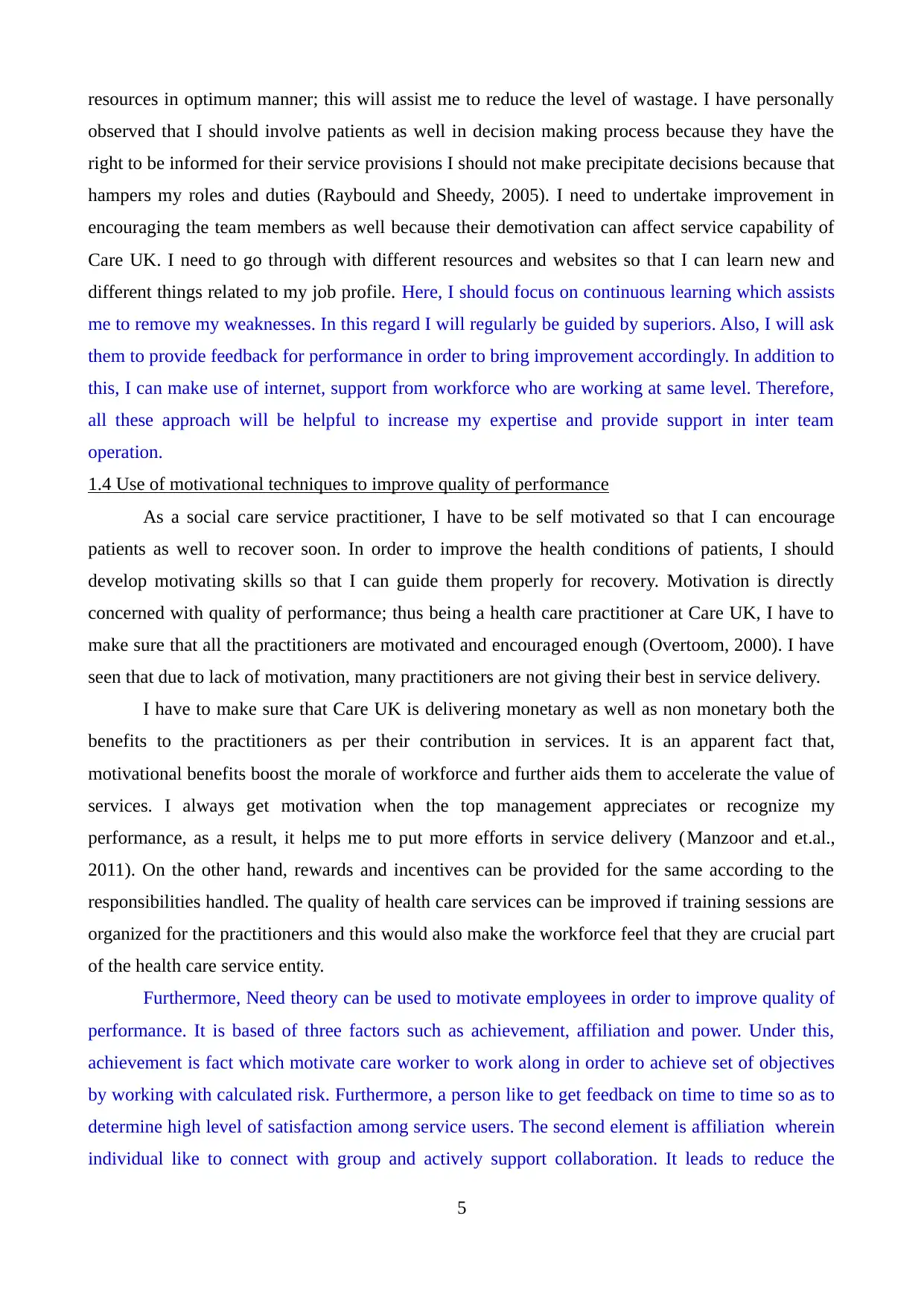
resources in optimum manner; this will assist me to reduce the level of wastage. I have personally
observed that I should involve patients as well in decision making process because they have the
right to be informed for their service provisions I should not make precipitate decisions because that
hampers my roles and duties (Raybould and Sheedy, 2005). I need to undertake improvement in
encouraging the team members as well because their demotivation can affect service capability of
Care UK. I need to go through with different resources and websites so that I can learn new and
different things related to my job profile. Here, I should focus on continuous learning which assists
me to remove my weaknesses. In this regard I will regularly be guided by superiors. Also, I will ask
them to provide feedback for performance in order to bring improvement accordingly. In addition to
this, I can make use of internet, support from workforce who are working at same level. Therefore,
all these approach will be helpful to increase my expertise and provide support in inter team
operation.
1.4 Use of motivational techniques to improve quality of performance
As a social care service practitioner, I have to be self motivated so that I can encourage
patients as well to recover soon. In order to improve the health conditions of patients, I should
develop motivating skills so that I can guide them properly for recovery. Motivation is directly
concerned with quality of performance; thus being a health care practitioner at Care UK, I have to
make sure that all the practitioners are motivated and encouraged enough (Overtoom, 2000). I have
seen that due to lack of motivation, many practitioners are not giving their best in service delivery.
I have to make sure that Care UK is delivering monetary as well as non monetary both the
benefits to the practitioners as per their contribution in services. It is an apparent fact that,
motivational benefits boost the morale of workforce and further aids them to accelerate the value of
services. I always get motivation when the top management appreciates or recognize my
performance, as a result, it helps me to put more efforts in service delivery (Manzoor and et.al.,
2011). On the other hand, rewards and incentives can be provided for the same according to the
responsibilities handled. The quality of health care services can be improved if training sessions are
organized for the practitioners and this would also make the workforce feel that they are crucial part
of the health care service entity.
Furthermore, Need theory can be used to motivate employees in order to improve quality of
performance. It is based of three factors such as achievement, affiliation and power. Under this,
achievement is fact which motivate care worker to work along in order to achieve set of objectives
by working with calculated risk. Furthermore, a person like to get feedback on time to time so as to
determine high level of satisfaction among service users. The second element is affiliation wherein
individual like to connect with group and actively support collaboration. It leads to reduce the
5
observed that I should involve patients as well in decision making process because they have the
right to be informed for their service provisions I should not make precipitate decisions because that
hampers my roles and duties (Raybould and Sheedy, 2005). I need to undertake improvement in
encouraging the team members as well because their demotivation can affect service capability of
Care UK. I need to go through with different resources and websites so that I can learn new and
different things related to my job profile. Here, I should focus on continuous learning which assists
me to remove my weaknesses. In this regard I will regularly be guided by superiors. Also, I will ask
them to provide feedback for performance in order to bring improvement accordingly. In addition to
this, I can make use of internet, support from workforce who are working at same level. Therefore,
all these approach will be helpful to increase my expertise and provide support in inter team
operation.
1.4 Use of motivational techniques to improve quality of performance
As a social care service practitioner, I have to be self motivated so that I can encourage
patients as well to recover soon. In order to improve the health conditions of patients, I should
develop motivating skills so that I can guide them properly for recovery. Motivation is directly
concerned with quality of performance; thus being a health care practitioner at Care UK, I have to
make sure that all the practitioners are motivated and encouraged enough (Overtoom, 2000). I have
seen that due to lack of motivation, many practitioners are not giving their best in service delivery.
I have to make sure that Care UK is delivering monetary as well as non monetary both the
benefits to the practitioners as per their contribution in services. It is an apparent fact that,
motivational benefits boost the morale of workforce and further aids them to accelerate the value of
services. I always get motivation when the top management appreciates or recognize my
performance, as a result, it helps me to put more efforts in service delivery (Manzoor and et.al.,
2011). On the other hand, rewards and incentives can be provided for the same according to the
responsibilities handled. The quality of health care services can be improved if training sessions are
organized for the practitioners and this would also make the workforce feel that they are crucial part
of the health care service entity.
Furthermore, Need theory can be used to motivate employees in order to improve quality of
performance. It is based of three factors such as achievement, affiliation and power. Under this,
achievement is fact which motivate care worker to work along in order to achieve set of objectives
by working with calculated risk. Furthermore, a person like to get feedback on time to time so as to
determine high level of satisfaction among service users. The second element is affiliation wherein
individual like to connect with group and actively support collaboration. It leads to reduce the
5
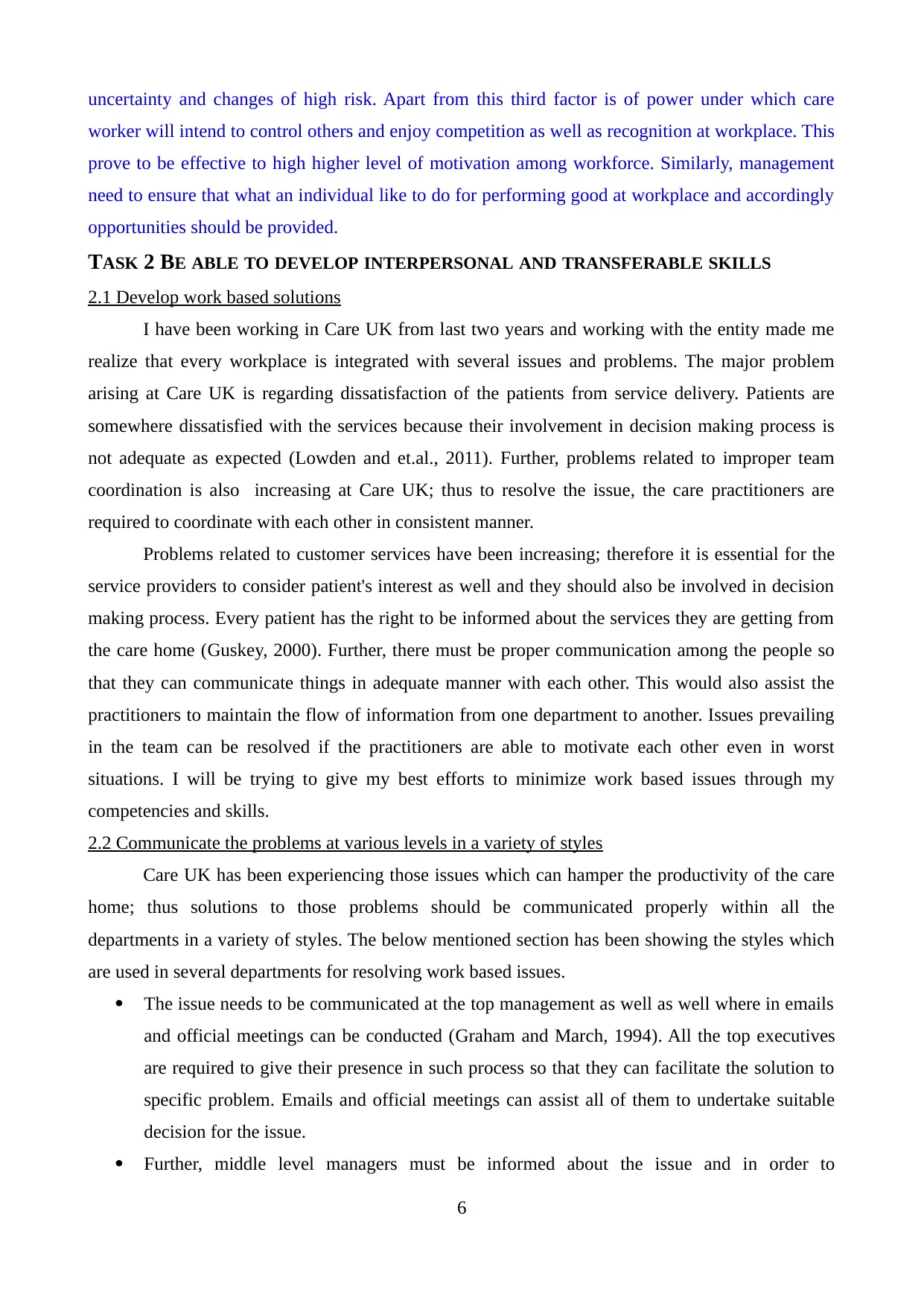
uncertainty and changes of high risk. Apart from this third factor is of power under which care
worker will intend to control others and enjoy competition as well as recognition at workplace. This
prove to be effective to high higher level of motivation among workforce. Similarly, management
need to ensure that what an individual like to do for performing good at workplace and accordingly
opportunities should be provided.
TASK 2 BE ABLE TO DEVELOP INTERPERSONAL AND TRANSFERABLE SKILLS
2.1 Develop work based solutions
I have been working in Care UK from last two years and working with the entity made me
realize that every workplace is integrated with several issues and problems. The major problem
arising at Care UK is regarding dissatisfaction of the patients from service delivery. Patients are
somewhere dissatisfied with the services because their involvement in decision making process is
not adequate as expected (Lowden and et.al., 2011). Further, problems related to improper team
coordination is also increasing at Care UK; thus to resolve the issue, the care practitioners are
required to coordinate with each other in consistent manner.
Problems related to customer services have been increasing; therefore it is essential for the
service providers to consider patient's interest as well and they should also be involved in decision
making process. Every patient has the right to be informed about the services they are getting from
the care home (Guskey, 2000). Further, there must be proper communication among the people so
that they can communicate things in adequate manner with each other. This would also assist the
practitioners to maintain the flow of information from one department to another. Issues prevailing
in the team can be resolved if the practitioners are able to motivate each other even in worst
situations. I will be trying to give my best efforts to minimize work based issues through my
competencies and skills.
2.2 Communicate the problems at various levels in a variety of styles
Care UK has been experiencing those issues which can hamper the productivity of the care
home; thus solutions to those problems should be communicated properly within all the
departments in a variety of styles. The below mentioned section has been showing the styles which
are used in several departments for resolving work based issues.
The issue needs to be communicated at the top management as well as well where in emails
and official meetings can be conducted (Graham and March, 1994). All the top executives
are required to give their presence in such process so that they can facilitate the solution to
specific problem. Emails and official meetings can assist all of them to undertake suitable
decision for the issue.
Further, middle level managers must be informed about the issue and in order to
6
worker will intend to control others and enjoy competition as well as recognition at workplace. This
prove to be effective to high higher level of motivation among workforce. Similarly, management
need to ensure that what an individual like to do for performing good at workplace and accordingly
opportunities should be provided.
TASK 2 BE ABLE TO DEVELOP INTERPERSONAL AND TRANSFERABLE SKILLS
2.1 Develop work based solutions
I have been working in Care UK from last two years and working with the entity made me
realize that every workplace is integrated with several issues and problems. The major problem
arising at Care UK is regarding dissatisfaction of the patients from service delivery. Patients are
somewhere dissatisfied with the services because their involvement in decision making process is
not adequate as expected (Lowden and et.al., 2011). Further, problems related to improper team
coordination is also increasing at Care UK; thus to resolve the issue, the care practitioners are
required to coordinate with each other in consistent manner.
Problems related to customer services have been increasing; therefore it is essential for the
service providers to consider patient's interest as well and they should also be involved in decision
making process. Every patient has the right to be informed about the services they are getting from
the care home (Guskey, 2000). Further, there must be proper communication among the people so
that they can communicate things in adequate manner with each other. This would also assist the
practitioners to maintain the flow of information from one department to another. Issues prevailing
in the team can be resolved if the practitioners are able to motivate each other even in worst
situations. I will be trying to give my best efforts to minimize work based issues through my
competencies and skills.
2.2 Communicate the problems at various levels in a variety of styles
Care UK has been experiencing those issues which can hamper the productivity of the care
home; thus solutions to those problems should be communicated properly within all the
departments in a variety of styles. The below mentioned section has been showing the styles which
are used in several departments for resolving work based issues.
The issue needs to be communicated at the top management as well as well where in emails
and official meetings can be conducted (Graham and March, 1994). All the top executives
are required to give their presence in such process so that they can facilitate the solution to
specific problem. Emails and official meetings can assist all of them to undertake suitable
decision for the issue.
Further, middle level managers must be informed about the issue and in order to
6
⊘ This is a preview!⊘
Do you want full access?
Subscribe today to unlock all pages.

Trusted by 1+ million students worldwide
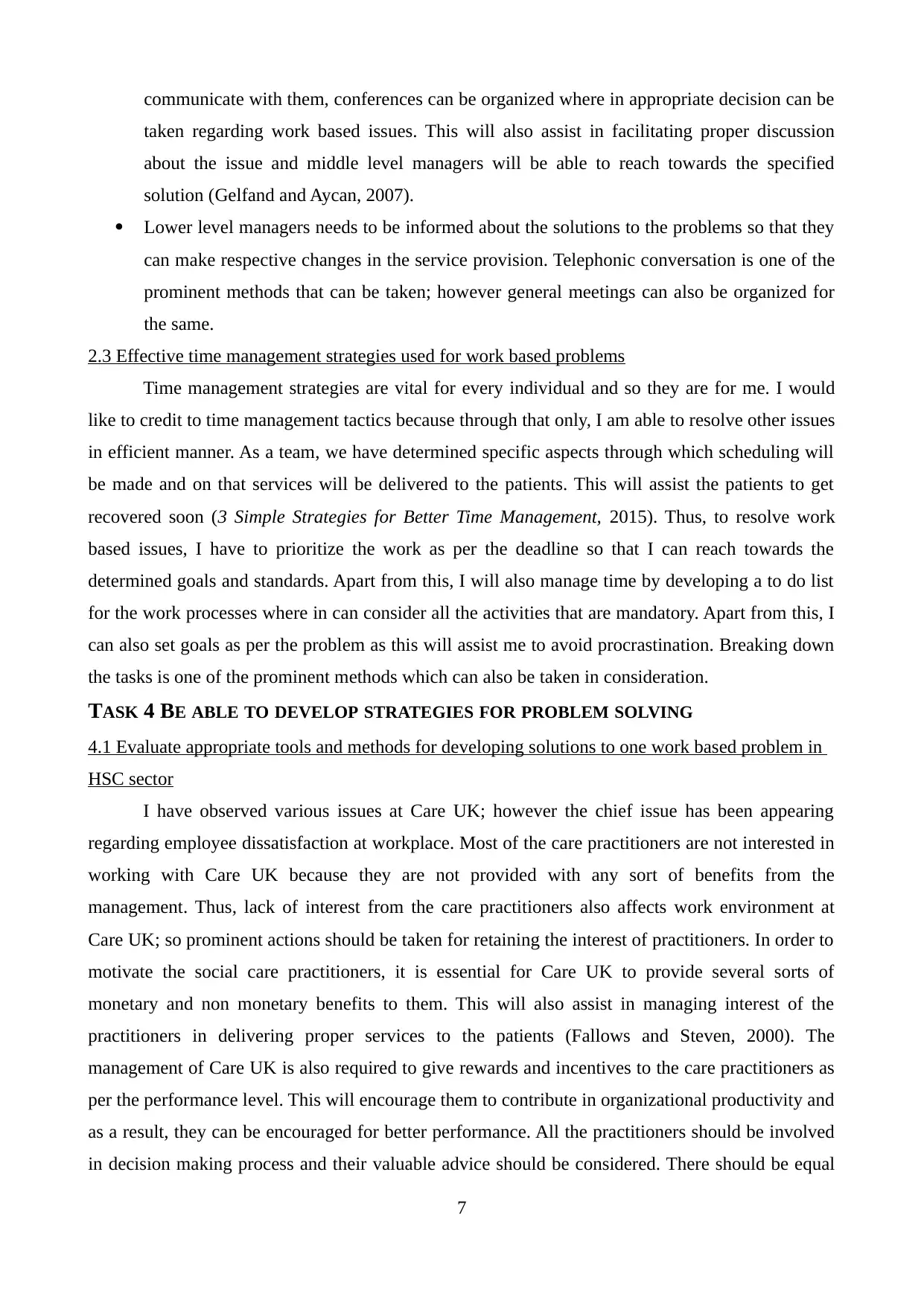
communicate with them, conferences can be organized where in appropriate decision can be
taken regarding work based issues. This will also assist in facilitating proper discussion
about the issue and middle level managers will be able to reach towards the specified
solution (Gelfand and Aycan, 2007).
Lower level managers needs to be informed about the solutions to the problems so that they
can make respective changes in the service provision. Telephonic conversation is one of the
prominent methods that can be taken; however general meetings can also be organized for
the same.
2.3 Effective time management strategies used for work based problems
Time management strategies are vital for every individual and so they are for me. I would
like to credit to time management tactics because through that only, I am able to resolve other issues
in efficient manner. As a team, we have determined specific aspects through which scheduling will
be made and on that services will be delivered to the patients. This will assist the patients to get
recovered soon (3 Simple Strategies for Better Time Management, 2015). Thus, to resolve work
based issues, I have to prioritize the work as per the deadline so that I can reach towards the
determined goals and standards. Apart from this, I will also manage time by developing a to do list
for the work processes where in can consider all the activities that are mandatory. Apart from this, I
can also set goals as per the problem as this will assist me to avoid procrastination. Breaking down
the tasks is one of the prominent methods which can also be taken in consideration.
TASK 4 BE ABLE TO DEVELOP STRATEGIES FOR PROBLEM SOLVING
4.1 Evaluate appropriate tools and methods for developing solutions to one work based problem in
HSC sector
I have observed various issues at Care UK; however the chief issue has been appearing
regarding employee dissatisfaction at workplace. Most of the care practitioners are not interested in
working with Care UK because they are not provided with any sort of benefits from the
management. Thus, lack of interest from the care practitioners also affects work environment at
Care UK; so prominent actions should be taken for retaining the interest of practitioners. In order to
motivate the social care practitioners, it is essential for Care UK to provide several sorts of
monetary and non monetary benefits to them. This will also assist in managing interest of the
practitioners in delivering proper services to the patients (Fallows and Steven, 2000). The
management of Care UK is also required to give rewards and incentives to the care practitioners as
per the performance level. This will encourage them to contribute in organizational productivity and
as a result, they can be encouraged for better performance. All the practitioners should be involved
in decision making process and their valuable advice should be considered. There should be equal
7
taken regarding work based issues. This will also assist in facilitating proper discussion
about the issue and middle level managers will be able to reach towards the specified
solution (Gelfand and Aycan, 2007).
Lower level managers needs to be informed about the solutions to the problems so that they
can make respective changes in the service provision. Telephonic conversation is one of the
prominent methods that can be taken; however general meetings can also be organized for
the same.
2.3 Effective time management strategies used for work based problems
Time management strategies are vital for every individual and so they are for me. I would
like to credit to time management tactics because through that only, I am able to resolve other issues
in efficient manner. As a team, we have determined specific aspects through which scheduling will
be made and on that services will be delivered to the patients. This will assist the patients to get
recovered soon (3 Simple Strategies for Better Time Management, 2015). Thus, to resolve work
based issues, I have to prioritize the work as per the deadline so that I can reach towards the
determined goals and standards. Apart from this, I will also manage time by developing a to do list
for the work processes where in can consider all the activities that are mandatory. Apart from this, I
can also set goals as per the problem as this will assist me to avoid procrastination. Breaking down
the tasks is one of the prominent methods which can also be taken in consideration.
TASK 4 BE ABLE TO DEVELOP STRATEGIES FOR PROBLEM SOLVING
4.1 Evaluate appropriate tools and methods for developing solutions to one work based problem in
HSC sector
I have observed various issues at Care UK; however the chief issue has been appearing
regarding employee dissatisfaction at workplace. Most of the care practitioners are not interested in
working with Care UK because they are not provided with any sort of benefits from the
management. Thus, lack of interest from the care practitioners also affects work environment at
Care UK; so prominent actions should be taken for retaining the interest of practitioners. In order to
motivate the social care practitioners, it is essential for Care UK to provide several sorts of
monetary and non monetary benefits to them. This will also assist in managing interest of the
practitioners in delivering proper services to the patients (Fallows and Steven, 2000). The
management of Care UK is also required to give rewards and incentives to the care practitioners as
per the performance level. This will encourage them to contribute in organizational productivity and
as a result, they can be encouraged for better performance. All the practitioners should be involved
in decision making process and their valuable advice should be considered. There should be equal
7
Paraphrase This Document
Need a fresh take? Get an instant paraphrase of this document with our AI Paraphraser
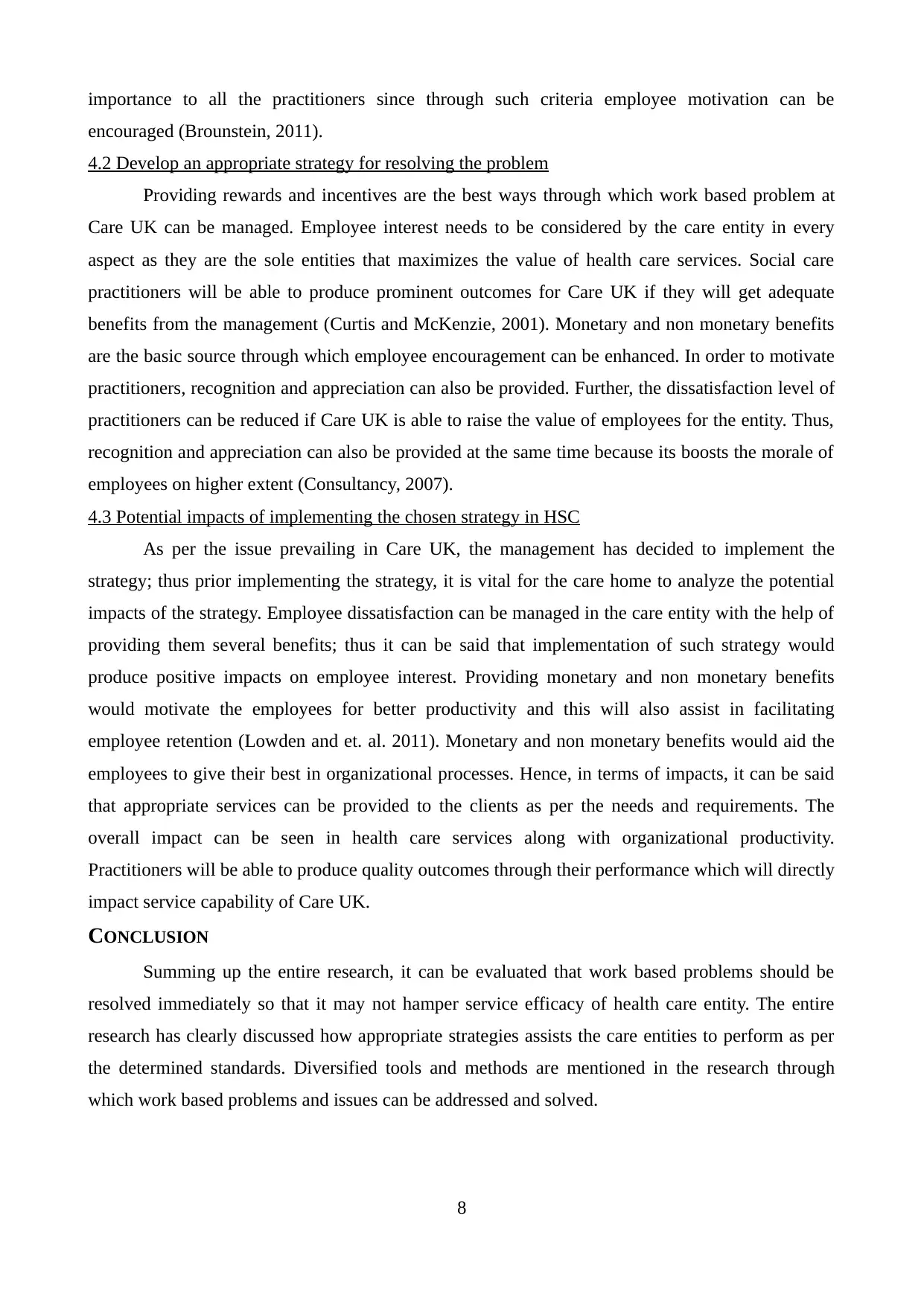
importance to all the practitioners since through such criteria employee motivation can be
encouraged (Brounstein, 2011).
4.2 Develop an appropriate strategy for resolving the problem
Providing rewards and incentives are the best ways through which work based problem at
Care UK can be managed. Employee interest needs to be considered by the care entity in every
aspect as they are the sole entities that maximizes the value of health care services. Social care
practitioners will be able to produce prominent outcomes for Care UK if they will get adequate
benefits from the management (Curtis and McKenzie, 2001). Monetary and non monetary benefits
are the basic source through which employee encouragement can be enhanced. In order to motivate
practitioners, recognition and appreciation can also be provided. Further, the dissatisfaction level of
practitioners can be reduced if Care UK is able to raise the value of employees for the entity. Thus,
recognition and appreciation can also be provided at the same time because its boosts the morale of
employees on higher extent (Consultancy, 2007).
4.3 Potential impacts of implementing the chosen strategy in HSC
As per the issue prevailing in Care UK, the management has decided to implement the
strategy; thus prior implementing the strategy, it is vital for the care home to analyze the potential
impacts of the strategy. Employee dissatisfaction can be managed in the care entity with the help of
providing them several benefits; thus it can be said that implementation of such strategy would
produce positive impacts on employee interest. Providing monetary and non monetary benefits
would motivate the employees for better productivity and this will also assist in facilitating
employee retention (Lowden and et. al. 2011). Monetary and non monetary benefits would aid the
employees to give their best in organizational processes. Hence, in terms of impacts, it can be said
that appropriate services can be provided to the clients as per the needs and requirements. The
overall impact can be seen in health care services along with organizational productivity.
Practitioners will be able to produce quality outcomes through their performance which will directly
impact service capability of Care UK.
CONCLUSION
Summing up the entire research, it can be evaluated that work based problems should be
resolved immediately so that it may not hamper service efficacy of health care entity. The entire
research has clearly discussed how appropriate strategies assists the care entities to perform as per
the determined standards. Diversified tools and methods are mentioned in the research through
which work based problems and issues can be addressed and solved.
8
encouraged (Brounstein, 2011).
4.2 Develop an appropriate strategy for resolving the problem
Providing rewards and incentives are the best ways through which work based problem at
Care UK can be managed. Employee interest needs to be considered by the care entity in every
aspect as they are the sole entities that maximizes the value of health care services. Social care
practitioners will be able to produce prominent outcomes for Care UK if they will get adequate
benefits from the management (Curtis and McKenzie, 2001). Monetary and non monetary benefits
are the basic source through which employee encouragement can be enhanced. In order to motivate
practitioners, recognition and appreciation can also be provided. Further, the dissatisfaction level of
practitioners can be reduced if Care UK is able to raise the value of employees for the entity. Thus,
recognition and appreciation can also be provided at the same time because its boosts the morale of
employees on higher extent (Consultancy, 2007).
4.3 Potential impacts of implementing the chosen strategy in HSC
As per the issue prevailing in Care UK, the management has decided to implement the
strategy; thus prior implementing the strategy, it is vital for the care home to analyze the potential
impacts of the strategy. Employee dissatisfaction can be managed in the care entity with the help of
providing them several benefits; thus it can be said that implementation of such strategy would
produce positive impacts on employee interest. Providing monetary and non monetary benefits
would motivate the employees for better productivity and this will also assist in facilitating
employee retention (Lowden and et. al. 2011). Monetary and non monetary benefits would aid the
employees to give their best in organizational processes. Hence, in terms of impacts, it can be said
that appropriate services can be provided to the clients as per the needs and requirements. The
overall impact can be seen in health care services along with organizational productivity.
Practitioners will be able to produce quality outcomes through their performance which will directly
impact service capability of Care UK.
CONCLUSION
Summing up the entire research, it can be evaluated that work based problems should be
resolved immediately so that it may not hamper service efficacy of health care entity. The entire
research has clearly discussed how appropriate strategies assists the care entities to perform as per
the determined standards. Diversified tools and methods are mentioned in the research through
which work based problems and issues can be addressed and solved.
8
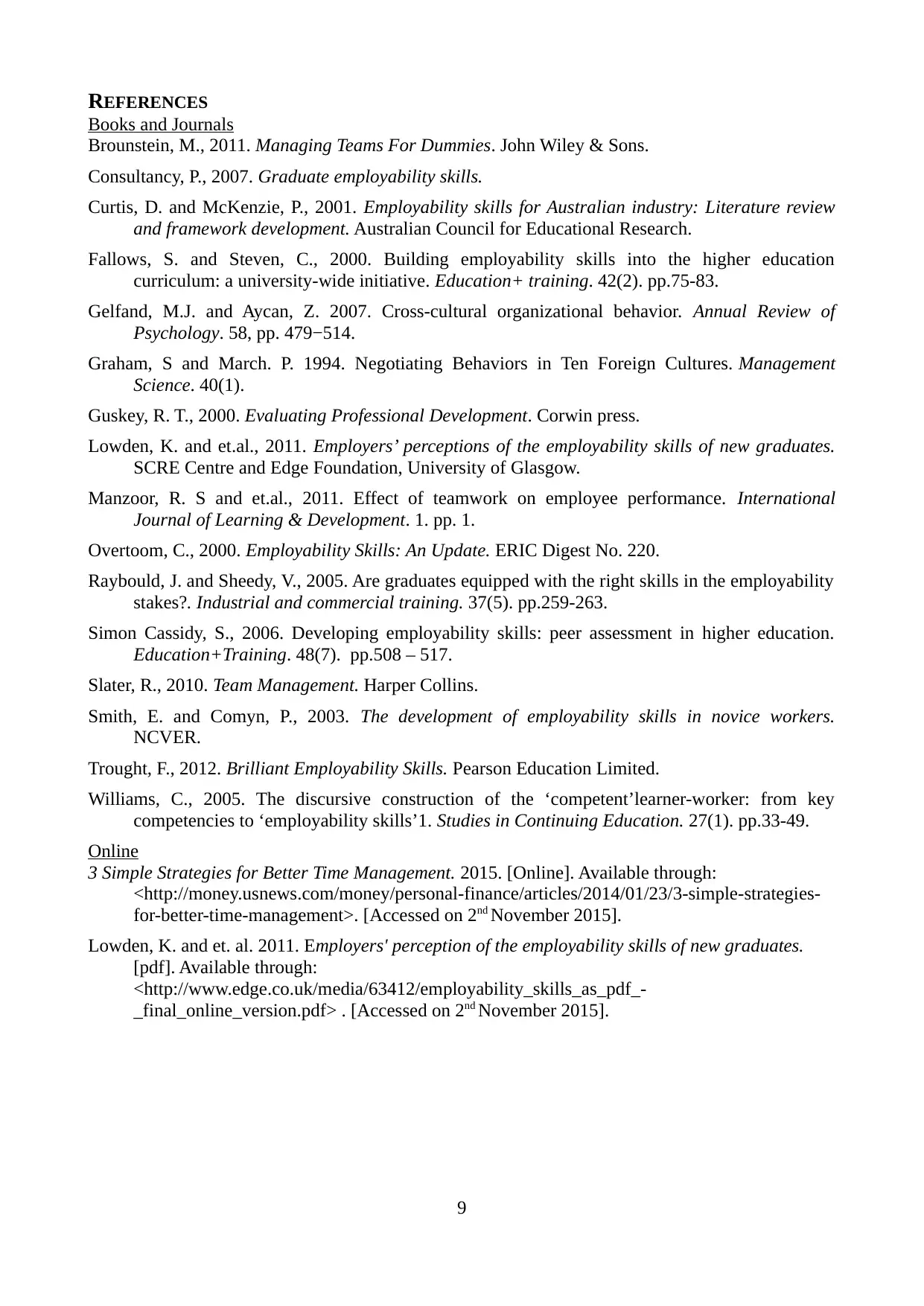
REFERENCES
Books and Journals
Brounstein, M., 2011. Managing Teams For Dummies. John Wiley & Sons.
Consultancy, P., 2007. Graduate employability skills.
Curtis, D. and McKenzie, P., 2001. Employability skills for Australian industry: Literature review
and framework development. Australian Council for Educational Research.
Fallows, S. and Steven, C., 2000. Building employability skills into the higher education
curriculum: a university-wide initiative. Education+ training. 42(2). pp.75-83.
Gelfand, M.J. and Aycan, Z. 2007. Cross-cultural organizational behavior. Annual Review of
Psychology. 58, pp. 479−514.
Graham, S and March. P. 1994. Negotiating Behaviors in Ten Foreign Cultures. Management
Science. 40(1).
Guskey, R. T., 2000. Evaluating Professional Development. Corwin press.
Lowden, K. and et.al., 2011. Employers’ perceptions of the employability skills of new graduates.
SCRE Centre and Edge Foundation, University of Glasgow.
Manzoor, R. S and et.al., 2011. Effect of teamwork on employee performance. International
Journal of Learning & Development. 1. pp. 1.
Overtoom, C., 2000. Employability Skills: An Update. ERIC Digest No. 220.
Raybould, J. and Sheedy, V., 2005. Are graduates equipped with the right skills in the employability
stakes?. Industrial and commercial training. 37(5). pp.259-263.
Simon Cassidy, S., 2006. Developing employability skills: peer assessment in higher education.
Education+Training. 48(7). pp.508 – 517.
Slater, R., 2010. Team Management. Harper Collins.
Smith, E. and Comyn, P., 2003. The development of employability skills in novice workers.
NCVER.
Trought, F., 2012. Brilliant Employability Skills. Pearson Education Limited.
Williams, C., 2005. The discursive construction of the ‘competent’learner-worker: from key
competencies to ‘employability skills’1. Studies in Continuing Education. 27(1). pp.33-49.
Online
3 Simple Strategies for Better Time Management. 2015. [Online]. Available through:
<http://money.usnews.com/money/personal-finance/articles/2014/01/23/3-simple-strategies-
for-better-time-management>. [Accessed on 2nd November 2015].
Lowden, K. and et. al. 2011. Employers' perception of the employability skills of new graduates.
[pdf]. Available through:
<http://www.edge.co.uk/media/63412/employability_skills_as_pdf_-
_final_online_version.pdf> . [Accessed on 2nd November 2015].
9
Books and Journals
Brounstein, M., 2011. Managing Teams For Dummies. John Wiley & Sons.
Consultancy, P., 2007. Graduate employability skills.
Curtis, D. and McKenzie, P., 2001. Employability skills for Australian industry: Literature review
and framework development. Australian Council for Educational Research.
Fallows, S. and Steven, C., 2000. Building employability skills into the higher education
curriculum: a university-wide initiative. Education+ training. 42(2). pp.75-83.
Gelfand, M.J. and Aycan, Z. 2007. Cross-cultural organizational behavior. Annual Review of
Psychology. 58, pp. 479−514.
Graham, S and March. P. 1994. Negotiating Behaviors in Ten Foreign Cultures. Management
Science. 40(1).
Guskey, R. T., 2000. Evaluating Professional Development. Corwin press.
Lowden, K. and et.al., 2011. Employers’ perceptions of the employability skills of new graduates.
SCRE Centre and Edge Foundation, University of Glasgow.
Manzoor, R. S and et.al., 2011. Effect of teamwork on employee performance. International
Journal of Learning & Development. 1. pp. 1.
Overtoom, C., 2000. Employability Skills: An Update. ERIC Digest No. 220.
Raybould, J. and Sheedy, V., 2005. Are graduates equipped with the right skills in the employability
stakes?. Industrial and commercial training. 37(5). pp.259-263.
Simon Cassidy, S., 2006. Developing employability skills: peer assessment in higher education.
Education+Training. 48(7). pp.508 – 517.
Slater, R., 2010. Team Management. Harper Collins.
Smith, E. and Comyn, P., 2003. The development of employability skills in novice workers.
NCVER.
Trought, F., 2012. Brilliant Employability Skills. Pearson Education Limited.
Williams, C., 2005. The discursive construction of the ‘competent’learner-worker: from key
competencies to ‘employability skills’1. Studies in Continuing Education. 27(1). pp.33-49.
Online
3 Simple Strategies for Better Time Management. 2015. [Online]. Available through:
<http://money.usnews.com/money/personal-finance/articles/2014/01/23/3-simple-strategies-
for-better-time-management>. [Accessed on 2nd November 2015].
Lowden, K. and et. al. 2011. Employers' perception of the employability skills of new graduates.
[pdf]. Available through:
<http://www.edge.co.uk/media/63412/employability_skills_as_pdf_-
_final_online_version.pdf> . [Accessed on 2nd November 2015].
9
⊘ This is a preview!⊘
Do you want full access?
Subscribe today to unlock all pages.

Trusted by 1+ million students worldwide
1 out of 9
Related Documents
Your All-in-One AI-Powered Toolkit for Academic Success.
+13062052269
info@desklib.com
Available 24*7 on WhatsApp / Email
![[object Object]](/_next/static/media/star-bottom.7253800d.svg)
Unlock your academic potential
Copyright © 2020–2026 A2Z Services. All Rights Reserved. Developed and managed by ZUCOL.




